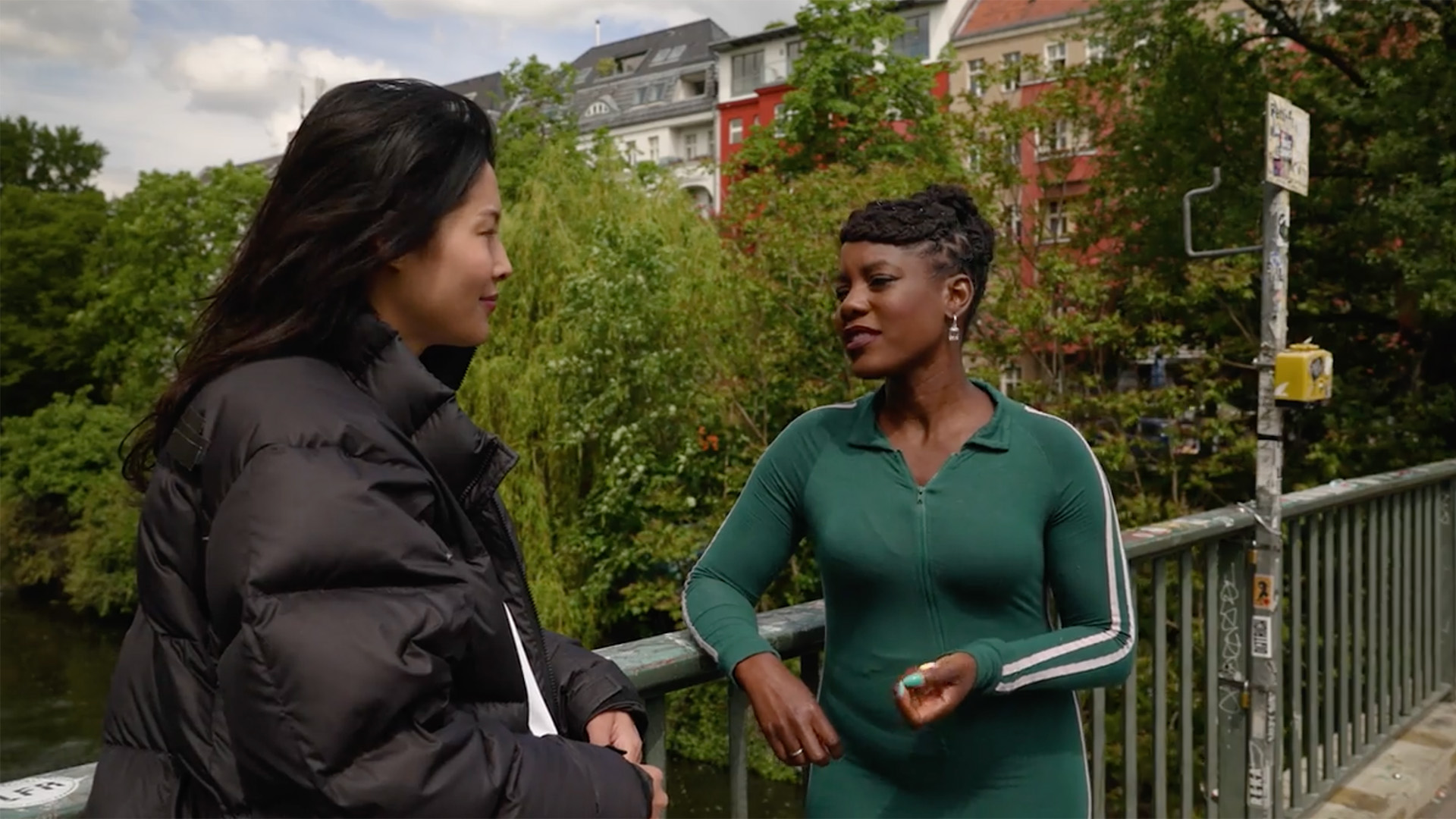Oneika Raymond is off to Berlin’s neighborhood of Kreuzberg, a thriving multicultural district just south of Mitte, for the final stop on her journey. There, she meets up with Dalad Kambhu, the chef and owner of MICHELIN-Starred Thai restaurant, Kin Dee. Together, they take a walking tour through Kreuzberg to get to know the district, and its large and growing collection of women-led eateries.
Oneika and Dalad meet each other in front of Kitten Deli, a women-owned breakfast joint that serves Israeli and Middle Eastern fare near to the Landwehr canal. The popular dining spot is located in Kreuzkölln, a small, inviting pocket of Berlin nestled between Kreuzberg and Neukölln that’s become known for its own bustling artistic community. It’s also the perfect gateway into Kreuzberg, just north across the canal.
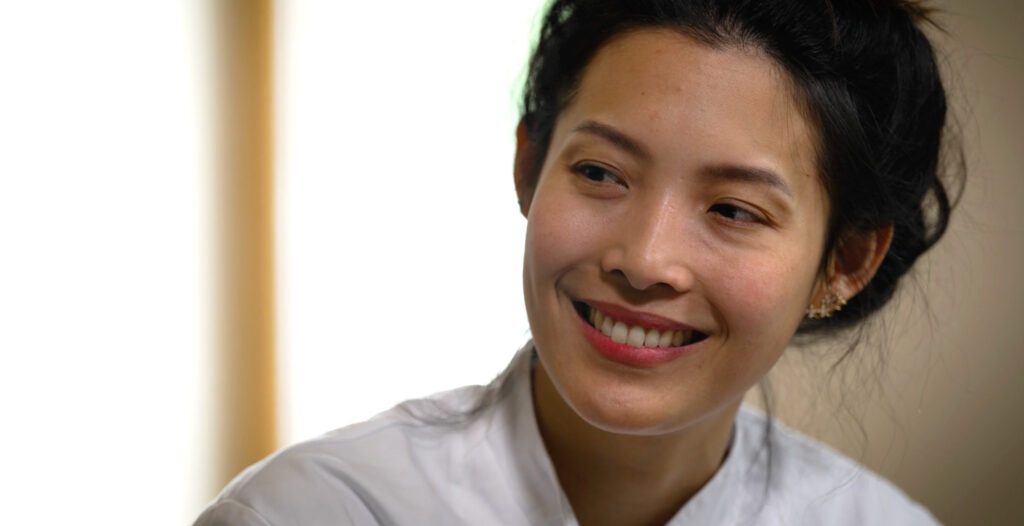
Dalad leads Oneika to one of the many walking bridges that cut across the Landwehr canal, stopping to admire the Turkish Market that runs alongside the canal every Tuesday and Friday. Here, visitors can find plenty: spices, fresh eggs, jars of olives, Anatolian dishes and even ornate textiles. It’s a true one-stop shop.
Along the way, we catch up with Dalad’s friend, Ash Lee, owner of Chungking Noodles, a casual spot for spicy, hand-pulled noodles in Kreuzberg. Ash helped Dalad take the leap to move to Berlin and start Kin Dee. Together, the two are devoted to helping other women find their footing in the city’s food industry.
Then, Dalad and Oneika head into Kreuzberg. While strolling its tree-lined sidewalks, Oneika takes in the neighborhood’s vibrant street-art, plentiful greenspaces, and vintage stores. In no time, we arrive at Markthalle Neun, Dalad’s go-to spot to source local produce for her restaurant.
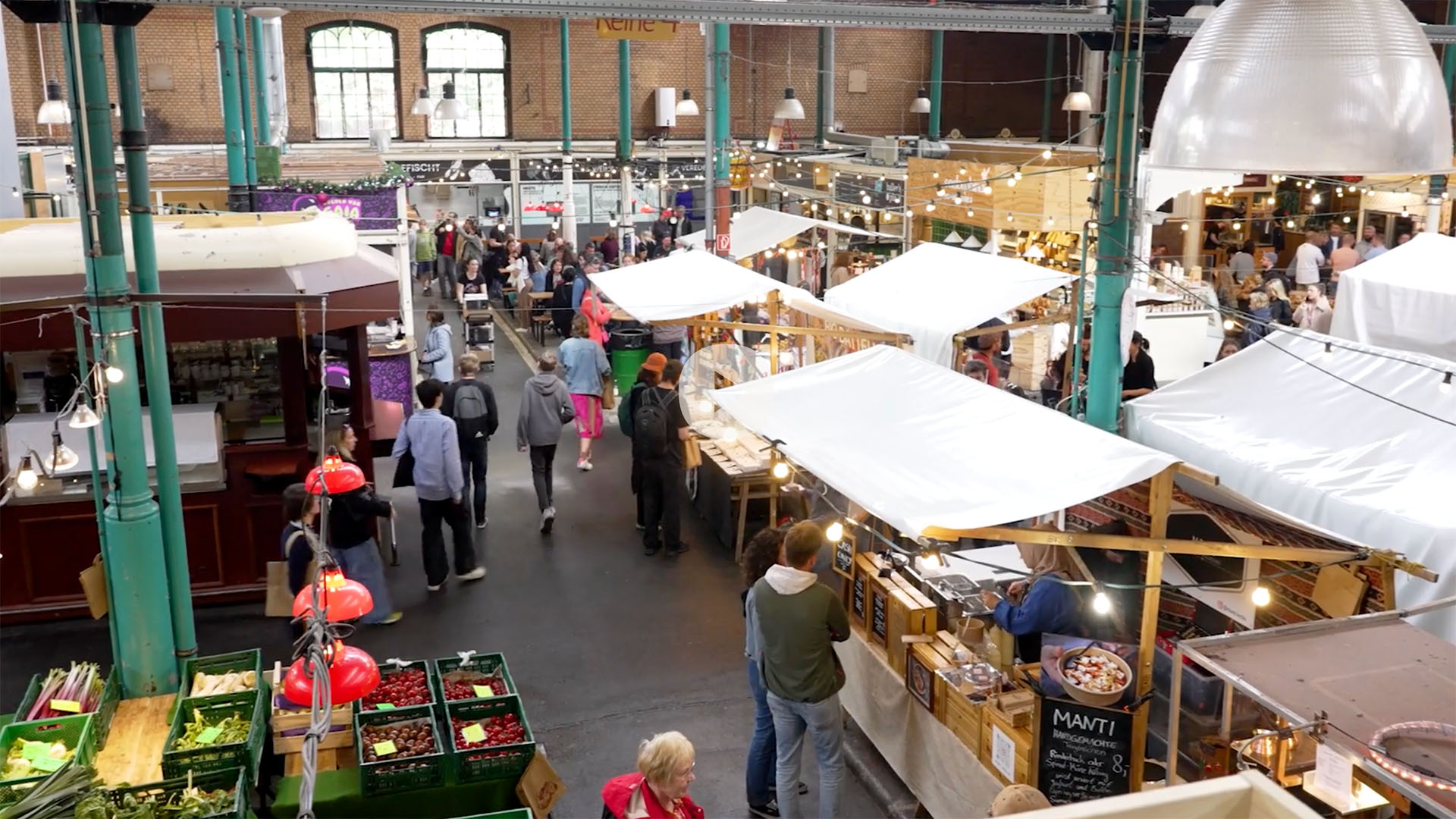
But first, the two make a beeline for the food stalls that fill the market hall with delicious smells. It’s lunchtime, and Dalad brings Oneika to one of her favorite spots in the market: Manti Berlin, a women-led, Turkish food stall that serves pillowy, ravioli-like dumplings called ‘manti’. Satisfied, and ready to continue their tour, Dalad and Oneika cut across Markthalle Neun to grab some vegetables for the restaurant — and then, they’re off to Kin Dee, their last stop of the day.
Once at Kin Dee, Dalad and Oneika relax into one of the restaurant’s repurposed tables for a sit down conversation about Dalad’s work in Berlin, and her hopes for the city’s burgeoning food scene. Dalad shares how she’s bringing the “spirit” of Thai flavors and cooking techniques to local and sustainable ingredients. And she offers advice to visitors looking to support the diverse, women-led eateries they love and want to see more of.
To read full episode transcripts from About the Journey and see photos of each featured destination, head to About the Journey on Marriott Bonvoy Traveler. Starting this season, you can also watch videos from select episodes on our Marriott Bonvoy YouTube channel.
PODCAST TRANSCRIPT
Dalad Kambhu (Field): You know what the most beautiful thing about Berlin is, right? – that people don’t think about? The most beautiful thing about this city is that Berlin is free.
Oneika Raymond (Field): Yeah.
Dalad Kambhu (Field): Berlin is free. If tomorrow I want to walk down the street with my bare feet and my swimming suit, nobody cares.
Oneika Raymond – VO: Welcome to About the Journey. I’m your host, Oneika Raymond, a travel journalist and member of Marriott Bonvoy.
This season, I’m uncovering the lesser known sides of six iconic cities. In my years of travel, I’ve found there is no better way to see a city than through its neighborhoods and the people who call them home. So I’ll be meeting up with in-the-know locals to show me what makes their homes one-of-a-kind: from the sights, sounds, and flavors, to the hidden gems, and *so much more*
This week, we’re exploring Berlin’s neighborhood of Kreuzberg, a thriving multicultural district just south of Mitte.
Bianca (Vox Pop): Kreuzberg is like the heart of Berlin. It’s very colorful, and a lot of different nations.
Ash Lee (Chungking Noodles – Vox Pop): Berlin is probably the most international city in Germany, and most of them live in Kreuzberg.
Oneika Raymond – VO: Kreuzberg has long been a mecca for newcomers to Berlin. The district’s openness to all cultures is a hallmark trait that can be seen everywhere: in its Turkish markets, varied Asian restaurants, and the mix of languages you’ll hear along the Landwehr canal. It’s this tapestry of cultures that’s brought me here today to meet up with MICHELIN-Star chef Dalad Kambhu for a tour.
Dalad Kambhu: The climate of the food scene in Germany seven years ago is very different than now. When I opened up the restaurant, people were like, “Oh, Thai food – it cannot be a [MICHELIN] Star food.”
Oneika Raymond – VO: Dalad moved to Berlin seven years ago to open Kin Dee, an upscale Thai eatery that combines local ingredients with Thai flavors and cooking techniques.
Dalad Kambhu: Now, we have a lot of females in the food scene, and surprisingly, a lot of them are here.
Oneika Raymond – VO: I’ve spent a lot of time in Berlin, and even lived here for extended periods, since my husband is a native Berliner. But, I haven’t spent much time in Kreuzberg. So it was time for me to see what I’d been missing.
Dalad Kambhu: Hello?
Oneika Raymond (Field): Hello. [hugging sounds] Lovely to meet you, Dalad.
Dalad Kambhu: Lovely to meet you, as well.
Oneika Raymond (Field): Thank you so much – really excited…
Oneika Raymond – VO: I meet Dalad in front of Kitten Deli, a women-owned breakfast joint that serves Israeli and Middle Eastern fare close to the Landwehr canal.
Oneika Raymond (Field): So, first things first, tell us, where are we?
Dalad Kambhu: We are in this neighborhood called Kreuzkölln. So technically we are in Neukölln, and the other side of the river is actually Kreuzberg, and because they merged, kind of meet in the way, people term it now Kreuzkölln.
Oneika Raymond – VO: It’s no surprise that the zone between Kreuzberg and Neukölln has become its own entity. The neighboring districts share many features, including a thriving artistic community.
Dalad Kambhu: It’s actually where I live. It’s very diverse, which is nice, and makes me feel a bit more at home.
Oneika Raymond – VO: At just over a mile east to west, and less than half a mile north to south, Kreuzkölln is a small, inviting pocket of Berlin, and a great gateway into Kreuzberg via the many walking bridges that cut across the canal.
Dalad Kambhu: So, right now we are on this wonderful bridge that crosses between Kreuzberg and Neukölln. And it’s actually really, really fun in summer. Like, people actually would come out, have a drink here, look at the river, the sunset. We always have some music going on, somehow. And there’s another bridge, even more, that the people literally just sit on the street, and you can’t even drive anymore. So it’s really cute here.
Oneika Raymond (Field): For somebody who’s not from the area, what are some landmarks that would help to kind of ground them, so that they know where they are?
Dalad Kambhu: Actually, this bridge would be like a really, one of the starting points, because you’re between Maybachufer and Paul-Lincke-Ufer. And Paul-Lincke-Ufer has a lot of cafes, a lot of little shops. And on Maybachufer, actually, you have the Turkish market two times a week.
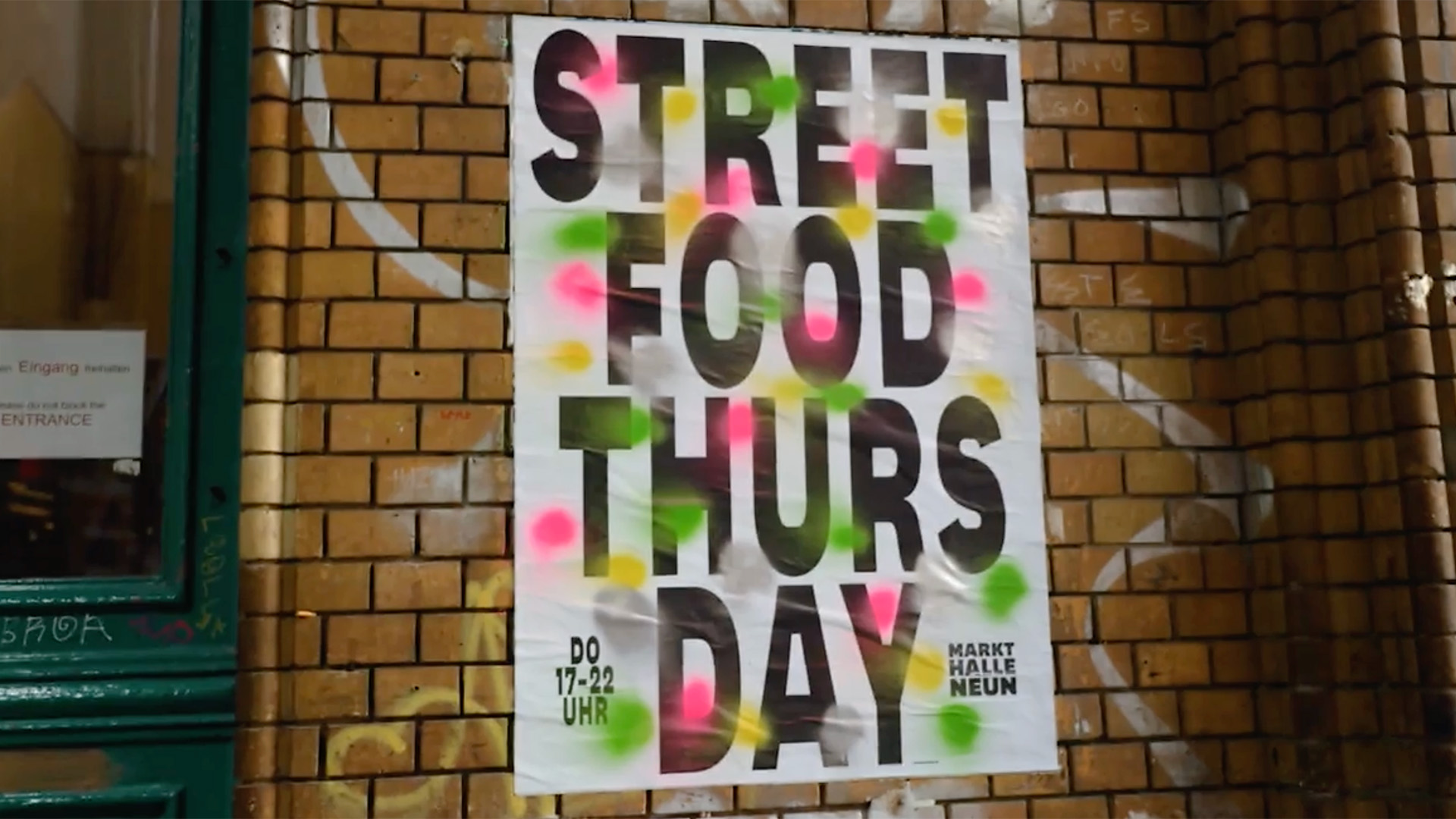
Oneika Raymond – VO: Every Tuesday and Friday, Maybachufer Street, which runs alongside the canal, transforms into an outdoor bazaar known to locals as the Turkish market. You can find everything here: spices, fresh eggs, jars of olives, Anatolian dishes and even ornate textiles. This market is truly a one-stop shop.
Oneika Raymond (Field): It sounds like there is a lot of character in this neighborhood. What inspires you, and your restaurant, about this neighborhood?
Dalad Kambhu: For me, personally, I think it’s the diversity.
Oneika Raymond (Field): I definitely understand what you mean. I think for me, as a Black woman, it is nice that you can come to an area like Kreuzberg, and you can see people of color. I guess it makes sense as to why you moved here [laughs] but if you could kind of explain to us in words where you lived before, and why you live here now?
Dalad Kambhu: I lived in New York for 10 years and that’s when my passion for food started. That’s when I started cooking for my friends in the apartment, and next thing you know, my friends kept wanting more and more. And I was working already in restaurants, and I wanted to be in the back of the kitchen…but no one allowed me to be in the back. They kept putting me in the front, because, you know, back when I was quite cute, young, a model.
Oneika Raymond (Field): [laughs]
Dalad Kambhu: That was kind of discouraging in the beginning. I thought, you know, as a young person, maybe that was my role? Because you didn’t know better, because other people I looked up to in the industry back then, they were all men, right? There were not that many women. But my passion didn’t stop there.
Oneika Raymond (Field): So, it sounds as though coming here really gave you the opportunity to fulfill this dream of opening your own restaurant. What is it about Kreuzberg that makes it so welcoming for female founders?
Dalad Kambhu: Well, first of all, I think Kreuzberg is actually really, really cool. And because of the diversity we have here, I think people are more welcoming to change and differences. And, you know, now we have a lot of young females in the food scene, and surprisingly, a lot of them are here. We have Mama Shabz, we have Chungking, we have Panda Noodles, we have, where we just met, at Kitten Deli — that’s also female-owned.
Oneika Raymond – VO: Berlin’s food scene is booming, and it’s gaining traction thanks to the innovative women behind some of the city’s best eateries. This is precisely what attracted Dalad to the city.
Dalad Kambhu: Stil in Berlin, you know, she’s a food blogger, and she made a map one year of female-owned places, and a lot of them are condensed in this area.
Oneika Raymond – VO: Dalad has forged deep relationships with many of the women working in Kreuzberg’s food scene, including Ash Lee.
Ash Lee (Chungking Noodles): My name is Ash Lee, but everybody calls me Ash. I’ve been living in Berlin for 13 years and I own a Chinese noodle restaurant in Kreuzberg called Chungking Noodles. We specialize in spicy noodles from the Chongqing region, which is a city in the [southwest] part of China, right next to Sichuan.
Oneika Raymond – VO: We met Ash in front of Kitten Deli, as part of our tour. Right away, she and Dalad start chatting about ingredients.
Dalad Kambhu: Are you getting mustard greens from here? I’m like, it’s a bakery girl — how are you gonna get mustard greens?
Ash Lee (Chungking Noodles): I have 150 portions of noodles…
Oneika Raymond – VO: Ash met Dalad in Berlin prior to her moving here, when she was still just considering taking the leap. The two became fast friends, and it was Ash, with some other mentors, who encouraged Dalad to make her dream a reality.
Ash Lee (Chungking Noodles): She was like, “Oh, I’m planning to open a Thai restaurant” – I’m like, “Yeah, we need some spice in this city.”
Oneika Raymond – VO: As a female chef of color, Ash related to Dalad’s hesitations about moving to a new city and country. Especially her fears about starting a fine dining restaurant that brings Thai flavors to Berlin.
Ash Lee (Chungking Noodles): Before I opened a restaurant, I was deciding what kind of restaurant I was gonna open. I love to go to just, like, a noodle joint or some restaurant that just offers one or two dishes. Really simple, with higher quality ingredients. And it was very difficult at the beginning because people was like, “Oh, why are noodles so expensive?” But we were like, “Look, we use seasonal ingredients, as local as possible.” It’s 2023, and Chinese food is one of the most skilled cuisines, in my opinion.
Oneika Raymond – VO: Together, Dalad and Ash have shown that Asian flavors have a place amongst the finest restaurants. Ash notes that part of that success comes from being in a place like Kreuzberg.
Ash Lee (Chungking Noodles): I live in Kreuzberg, I work in Kreuzberg. I almost never get out of my area. I do choose to be here for reasons. Because, in the beginning, when I opened a restaurant, I wasn’t sure if people were gonna like it spicy. A lot of people were just like, maybe they don’t even know what Chongqing spices are? But I feel like here, people are more international. It’s the beauty of being in Kreuzberg. We have a lot of regular customers. We have a very strong “spicy community”, we call it.
Oneika Raymond – VO: We leave Ash to let her prep for another busy Friday night at Chungking Noodles and continue our tour. As we walk up the shady, tree-lined streets of Kreuzberg, treasures abound. Street art covers nearly every wall we pass by. And we stumble upon little parks with ping pong tables, and playgrounds with themes like pirate ships, and Robin Hood.
Oneika Raymond (Field): So the thing about Kreuzberg, for me, is that visually it is so different from, say, the western part of Berlin…the really manicured buildings and sidewalks. And here, it’s a completely different story. It’s colorful. What is your, kind of, perspective on that?
Dalad Kambhu: So, Berlin has its history. First of all, they had the Wall that divided East and West, right? When they were reconstructing buildings where they were bombed, it became more of social housing, you know, style.
Oneika Raymond (Field): Yes.
Oneika Raymond – VO: While Kreuzberg was on the west side of the Berlin Wall, it was and still is home to Checkpoint Charlie, the well-known crossing point between East and West Berlin. The proximity to the wall and the lasting effects of World War II meant Kreuzberg was slow to rebuild. But the new residents it attracted: artists, students, and immigrants – laid the foundation for its eclectic spirit today.
Oneika Raymond (Field): You know what? People always ask me, “Oneika, you spend a lot of time in Berlin? What makes Berlin, Berlin?” And it’s that people just don’t care
Dalad Kambhu: …what you do.
Oneika Raymond (Field): You can come and wear whatever the heck you want.
Dalad Kambhu: Yes!
Oneika Raymond (Field): The idea here is just to come as you are. It doesn’t matter what you look like. It doesn’t matter whether or not you wear brands. There is a lack of pretension.
Oneika Raymond – VO: As we walk, Dalad points out one of Kreuzberg’s many vintage shops – racks and racks of beautiful leather jackets tempt us. Before we know it, we’re at our next stop on the tour.
Oneika Raymond (Field): There are so many nooks and crannies in Berlin, and I love rounding a corner and seeing, kind of like, this market vibe.
Oneika Raymond – VO: We stop and stand in front of a grand cement archway with retro, red block lettering. It spells out: Markthalle.
Dalad Kambhu: So now we are about to arrive at my favorite market. We do a little shopping, grocery shopping for my house, and also for the restaurant, called Markthalle Neun.
Dalad Kambhu: Dalad leads me through a set of glass paneled, blue trimmed doors into Markthalle Neun. High vaulted ceilings let natural light flood into the historic building. We head to Dalad’s favorite spots in the market, starting with the women-led food stall Manti Berlin.
Dalad Kambhu: Hi, how are you?
Manti Berlin Stall Owner: [indiscernible]
Dalad Kambhu: Thank you, fine. We would like to get, um…which one would you like?
Oneika Raymond (Field): I think I’ll go with the spinach and cheese.
Oneika Raymond – VO: Manti is a beloved Turkish dumpling dish. Pillowy, ravioli-like dough is stuffed with fillings like beef, spinach and cheese. They’re then boiled, and served with a creamy yogurt sauce.
Oneika Raymond (Field): This is delicious. So good. These dumplings are filled with spinach and cheese.
Dalad Kambhu: Mm-hmm. And you know, it’s not too heavy because you have these like spices and a little bit of chili.
Oneika Raymond (Field): Mh-hmm, I think what I love is that I’m having Turkish dumplings in Berlin.
Dalad Kambhu: You know, we have a lot of Turkish population here. They came here after the war to help rebuild the city.
Oneika Raymond (Field): Mm-hmm.
Dalad Kambhu: And they stayed, and there are traits of the culture in Berlin, you know,
Oneika Raymond (Field): Yeah, absolutely.
Dalad Kambhu: …that I think coming to Berlin, you have to try Turkish food.
Oneika Raymond – VO: Berlin is home to the largest Turkish population outside of Turkey, and the majority of the community reside in Kreuzberg and Neukölln. Their contribution to the culture here cannot be understated.
Oneika Raymond (Field): It’s such an important part of, like, Berlin’s fabric.
Oneika Raymond – VO: It’s said that the doner kebab, one of Berlin’s favorite street foods, originated in West Berlin, as a symbol of the merging of Turkish and German tastes. It’s a dynamic that Dalad knows all too well, as she’s paired local produce with Thai flavors.
Dalad Kambhu: So, here is the little vegetable store that I always, always order from for the restaurant. Here, for example is white asparagus, and this is the one we use at the restaurant.
Oneika Raymond (Field): Having come to Germany many times, I know that white asparagus is a thing, and there’s an asparagus season, and so you’re going to see lots of restaurants base their entire menu off of this white asparagus. So how do you incorporate asparagus into the Thai cuisine that you serve at the restaurant?
Dalad Kambhu: So basically I look at the produce like, hey, if this were to happen to be available in Thailand, how would we cook it?
Oneika Raymond (Field): I see.
Dalad Kambhu: So, for example, in this case, we steam them quickly and then we kind of slightly grill them, get a little bit smokey, cut them, and toss them with a fresh kind of dressing…
Oneika Raymond (Field): Mm-hmm.
Dalad Kambhu: …with, like, lamb, fish sauce and onions. And then we grate them with a little bit of salted eggs, a little bit of crispy shallots…
Oneika Raymond (Field): Mmm.
Dalad Kambhu: …lemon grass. Delicious.
Oneika Raymond (Field): Delicious.
Dalad Kambhu: Yeah.
Oneika Raymond (Field): I just love how sustainable it is, right? I love the idea of using what is in season…
Dalad Kambhu: Yeah, what’s local.
Oneika Raymond (Field): Yes, so that really kind of shapes the menu, but I feel as though it’s an amazing marriage between the two cultures, right? You have German culture, German food, and then you blend that into your Thai cuisine, your culture, and your customs. So I love that kind of bonding that’s occurring there.
Dalad Kambhu: And when we first opened the restaurant, it actually was like a scandal because people here weren’t ready for Thai food to do it that way. And now it’s sort of, like, a norm for every restaurant.
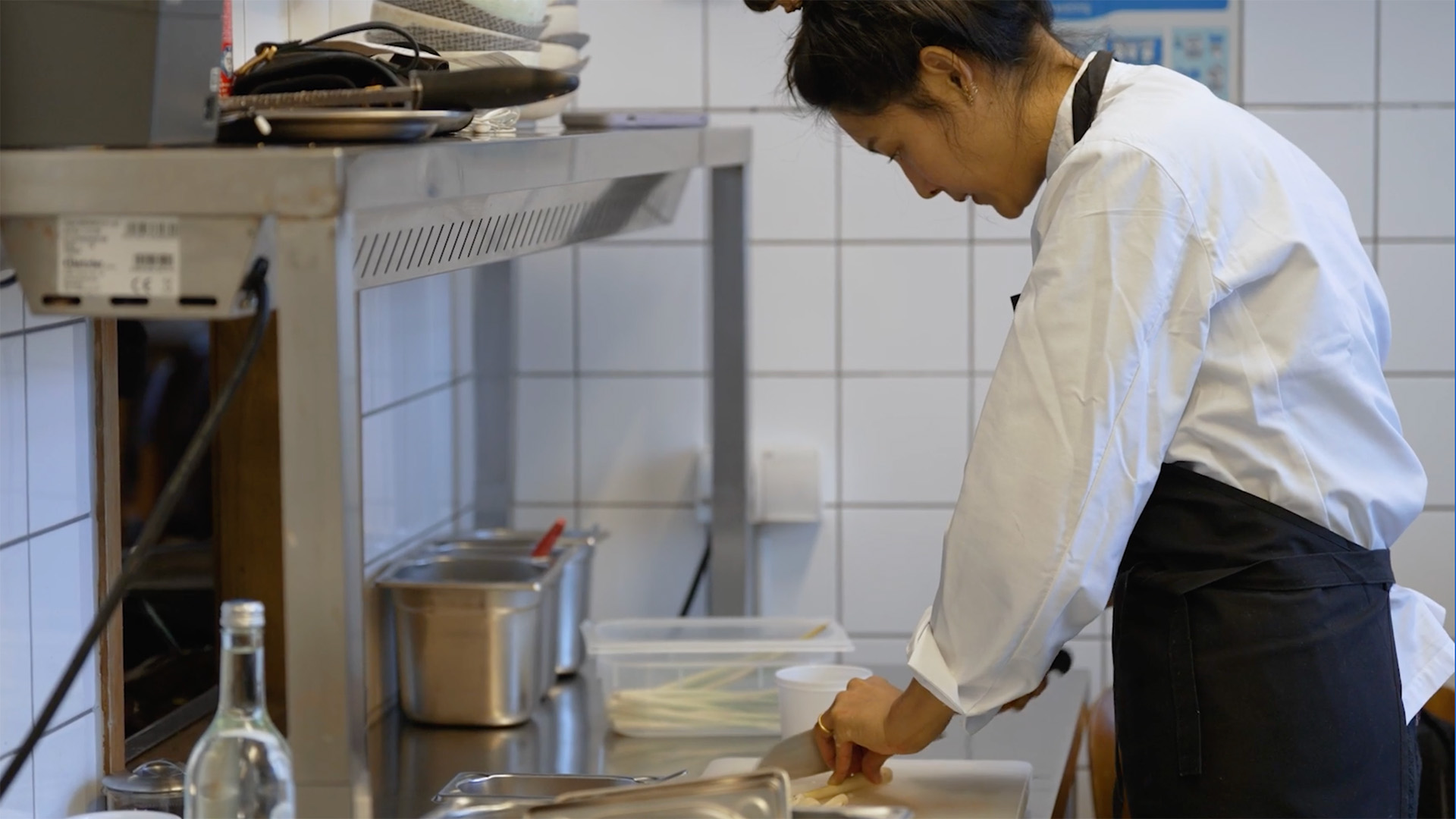
Oneika Raymond – VO: Dalad continues to use her restaurant, Kin Dee, as a vehicle to push forward the causes she cares deeply for. Today, she looks to provide opportunities to more women and people of color who are new to Berlin and finding their footing. We sat down at Kin Dee, our final stop of the day, so that Dalad could show me the culmination of years of hard work, and to talk about the work ahead to make more of Berlin’s food scene as rich and varied as in Kreuzberg.
Oneika Raymond (Intv): For someone who doesn’t have Thai background, or somebody who is not familiar with the culture, how do you want them to feel when they come in here – when they sit down and eat your food?
Dalad Kambhu: I want them to experience my home, I guess. Because I don’t know that many Thai restaurants that do it the way we do it, actually, I don’t know any. Like, we sort of made it clear that you’re going to share the food because it’s how we eat it. When the rice course comes, we are gonna suggest you to use a spoon because that’s how we do it. We’re gonna start with a sour little thing, and fresh – some ceviche, some salads, just because that’s kind of like how we eat it in Thailand. We start with a fresh…
Oneika Raymond (Intv): Mm-hmm.
Dalad Kambhu: …acidic dishes and then we go to rice and curry and more stuff, because that’s how we eat growing up. And I just want them to experience what it’s like to eat Thai food — the spirits of it.
Oneika Raymond (Intv): Now, you were the youngest woman in Germany to ever get a MICHELIN Star…
Dalad Kambhu: Yes.
Oneika Raymond (Intv): …which is a huge feat. You know, not only a female-owned business, but a minority-owned business, as well. So again, absolutely incredible. What has it meant to you, to be able to achieve that?
Dalad Kambhu: Mm. You know, you have to remember one thing: the climate of the food scene in Germany seven years ago is very different than now. When I opened this restaurant, people were like, “Oh, Thai food. It cannot be a [MICHELIN] Star food,” you know? “Oh, why don’t you use papaya?” But what I was trying to do is just, really, I just want to prove to the world that at least here, is to showcase what Thai food really is. We use organic coconut milk. Curry paste, we made in-house. But, what I would say…what it means to me is only one thing: the night before we got the MICHELIN Star, and the night after we got the MICHELIN Star, it was the same food.
Oneika Raymond (Intv): Yeah.
Dalad Kambhu: Exactly the same food, but completely different feedback. And I think it is important for us to keep in mind how many other amazing restaurants there are that…they didn’t have a Star, and then people just didn’t give them the acknowledgement, you know? So, I think this is a great point for everyone to remember that, if you like something, just eat it. [laughs]
Oneika Raymond (Intv): I will eat all the things that I like.
Oneika Raymond – VO: Berlin has become a place for young chefs to put down roots due to its openness to creative endeavors and its strong pop up restaurant culture. It’s a spirit of experimentation and play that Dalad uses in every dish.
Dalad Kambhu: When you come here, we serve you food, which is usually like curry, deep-fried fish, something sauteed, or something else…and that comes with rice. And every night we have some left, because we cannot not have enough rice. So, even though, excellent estimation…I don’t wanna throw away rice. So we decided that the best thing to do about it was to turn them into a cracker.
Oneika Raymond (Intv): Yeah. This is, this is really…I was trying not to chew [crunching sounds] while we were talking…very crunchy.
Dalad Kambhu: Very crunchy.
Oneika Raymond (Intv): Really tasty.
Dalad Kambhu: You should try it with the chili paste. Yeah.
Oneika Raymond (Intv): Oh, okay. I didn’t even see the paste. Mmm, the chili paste is excellent. It’s not that hot, but I am from the Caribbean, so I feel as though, [laughs] I feel as though I’m okay with spicy food. Oneika Raymond: So we know that sustainability is really at the heart of what you do, and we can see it displayed in the dishes. Is that something that you’re intentional about?
Dalad Kambhu: I’m definitely intentional about local produce. You know, we still use coriander in the winter from Thailand, and in the summer we use it from here. You know, like it depends on what they have available. So, instead of making a lot of money, I choose to be the path of change. I would like to be the positive effect.
Oneika Raymond: So in your estimation, people who are coming to Berlin, how can they be more conscious travelers?
Dalad Kambhu: Do research. We all are well aware now that women need more support, and that minorities need even more support. You know, in the main city…in any main city in the world…there’s so many options. I think it’s very, very important to look up where, before you go eat, is this place, you know, are they supporting local produce? Who is on that team? So, you know, there is information always out there.
Oneika Raymond: There are resources.
Dalad Kambhu: Yeah. We just have to look it up, and be conscious of it.
(Transition Music) Oneika Raymond: So it was a pleasant surprise to learn that there are so many women-owned and operated businesses in this neighborhood of Kreuzberg, and in the case of Dalad, I mean, coming and starting a business [laughs] a successful business, is just so impressive. I think it’s also imperative to visit these neighborhoods that are changing, and that are really serving to evolve the images of what it means to be a Berliner.
(Theme Music fades in)
Oneika Raymond – VO: That’s it for this season of About the Journey. Thank you to our Kreuzberg guide, Dalad Kambhu. And thanks to you all for coming along with me on this truly global neighborhood adventure. If you missed any episodes, they’re right here in your feed to catch up on.
About the Journey is produced by Marriott Bonvoy Traveler, At Will Media, and me, Oneika Raymond. Our Marriott producers are Robin Bennefield and Valerie Conners. Our AT WILL MEDIA producers are Kait Walsh, Kristy Westgard, Gale Straub and Elliot Davis. Mixing and original theme music composed by Andrew Holzberger.
Learn more about Dalad Kambhu and her restaurant Kin Dee at kindeeberlin.com.
You can learn more about visiting Kreuzberg and how to travel more meaningfully — from Marriott Bonvoy Traveler at traveler.marriott.com.
Stay, explore and discover the unexpected with Marriott Bonvoy’s 30 plus hotel brands and over 8000 hotels in cities around the world.
And if you liked this episode of About the Journey, please be sure to rate, review, and subscribe wherever you get your podcasts.
I’m your host, Oneika Raymond. See you next time.
